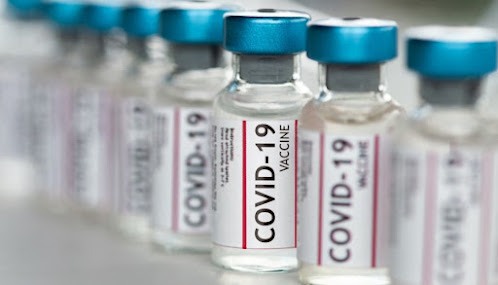COVID-19 vaccinations and fertility: What physicians wish patients knew
Despite the fact that COVID-19 vaccinations are effective in avoiding SARS-CoV-2 infection-related severe illness, hospitalization, and death, many persons who are eligible have chosen not to be vaccinated. This is often related to fears about negative side effects. A fake allegation on social media claimed that being vaccinated against COVID-19 might induce infertility in women, which sparked worry. COVID-19 vaccinations have no effect on fertility.
The Centers for Disease Control and Prevention (CDC) recommends COVID-19 immunisation for women who are attempting to conceive or may conceive in the future, as well as their partners. It's also important to have a COVID-19 vaccination booster dose when the time comes.
The American Medical Association's (AMA) What Doctors Wish People KnewTM series provides a forum for doctors to discuss what they want patients to know about today's health-care news, particularly during the COVID-19 epidemic.
Three doctors took the time to address what people should know about fertility and COVID-19 immunisation in this session. These are the members of the AMA:
An ob-gyn and senior medical director of the Everett Clinic in Washington, Nariman Heshmati, MD.
Dr. Theodore B. Jones, director of maternal foetal medicine at Beaumont Hospital in Dearborn, Michigan, is a maternal-fetal medicine expert.
Lanny F. Wilson, MD, is the leader of Amita Health's Physician Well-Being Program and the chair of obstetrics and gynaecology at Avalon University School of Medicine in Youngstown, Ohio.
COVID-19 vaccinations have no effect on fertility.
"With the COVID-19 vaccination, there is absolutely no need to be concerned about fertility," Dr. Wilson added, underlining that vaccines "do not induce infertility and do not impair fertility in any way."
While a research financed by the National Institutes of Health discovered that COVID-19 immunisation is connected to a minor, transitory increase in the menstrual cycle, Dr. Jones said that "no scientific evidence shows that COVID-19 vaccinations would cause reproductive difficulties." "Both the principal vaccination types—mRNA and adenovirus vaccines—do not seem to have mechanisms that would appear to link to reproductive function," she says.
"We now have studies that look at groups of people who are being tested for fertility or infertility, and vaccination status does not seem to change fertility depending on whether they get the immunisation or not," says the researcher.
"We're also gaining additional data from current studies," Dr. Heshmati added, "which gives us greater confidence in the COVID-19 vaccine's safety profile." "There was no difference between those who received COVID-19 vaccination and those who did not in a study from the Icahn School of Medicine at Mount Sinai that looked at fertility outcomes after COVID-19 vaccination, including egg quality, embryo quality and development, pregnancy rates, and early miscarriage."
Boost your COVID-19 vaccination.
"A booster dosage is suggested after you have finished the first COVID immunisation series," Dr. Heshmati added, emphasising that "the booster dose does not have to be the same brand of the covid vaccine you initially got."
"However, during pregnancy, mRNA COVID-19 vaccines are favoured over the Johnson & Johnson COVID-19 vaccine," he stated of the various COVID-9 vaccines available. "It's vital to remember that mRNA vaccines aren't live vaccines when we're talking about them." They don't change DNA, and there's no adjuvant to boost effectiveness."
Vaccination offers advantages for both the mother and the child.
When the time comes for a person to get pregnant, the COVID-19 immunizations may help the infant as well.
"The antibodies begin to flow through when the infant is still in the womb," Dr. Wilson said. "And if a person decides to nurse, the same antibodies are passed on to the baby via the breast milk."
"We know that antibodies cross the placenta and through breast milk when breastfeeding, and we believe that this has a protective effect," Dr. Heshmati explained, adding that a recent "study from 20 paediatric hospitals found that COVID-19 vaccination during pregnancy reduced the risk of infants being hospitalised with COVID-19 by 61%."
Dr. Jones said, "That's always a bonus feature of vaccinations—we may utilise it as a means to transfer the protection of the pregnant woman on to the baby." "The offers that infant some protection for, hopefully, a long enough length of time to allow it to get its own immunisation at some point."
COVID-19 is the true issue.
"The major message here is that catching COVID-19 may be harmful, especially if you're pregnant," Dr. Heshmati said. "With each passing day, we get more and more evidence that the COVID-19 vaccine is safe and effective in pregnancy."
"I would strongly advise anybody who is pregnant or thinking about becoming pregnant to get their COVID immunisation, not just for their own safety but also for the protection of their unborn child," he added.
"We're still probably fewer than half of pregnant patients being vaccinated," Dr. Jones said. "That's up from one in three approximately six months ago, but not by much." "There's still a lot of work to be done to make pregnant people feel at ease with immunizations."
Find out whether you're infertile.
"There are a lot of variables that might influence fertility, which is why there's an examination that looks at all of them," Dr. Jones said. "It's looking at things like sperm activity and if the egg is normal in terms of consistency and appearance," says the researcher.
It's also about "investigating hormonal disorders that may have an influence on conception." You might also look at concerns with inflammation and immunological elements that may influence it," he suggested. "It's an entire field devoted to assisting people who are having trouble conceiving on their own."
"A thorough checkup with an obstetrician-gynecologist or your general care physician allows for a discussion regarding your future fertility," Dr. Wilson stated. These tests are beneficial to "ensure that your blood pressure is normal before you get pregnant or that you do not have diabetes."
This also necessitates that everyone "be up to date on their vaccines," according to him. "Of course, we're talking about the COVID-19 vaccine, but other vaccinations should also be up to date as they prepare for pregnancy since we know that people's immune responses are reduced during pregnancy."


Comments
Post a Comment